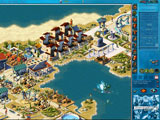 Zeus is the fifth
in Impression’s impressive City Builder series, and like Caesar and Pharaoh before
it, the game’s focus is on hacking a town site out of the ancient wilderness and
delicately balancing available resources and trade until you’ve created a classical
metropolis. Unlike Caesar and Pharaoh, however, Zeus doesn’t try to sell itself as a
“historical” game—for one thing, Greek mythology takes a star turn in the
form of gods, monsters, and heroes; for another, the designers have simplified some of the
more challenging aspects of the earlier games. Of course, many gamers viewed “some of
the more challenging aspects of the earlier games” as annoying niggles that drained
otherwise engaging games of their fun. And
in fact how you’ll like Zeus has a lot to do with your attitude towards the earlier
City Builder games. If you find micromanaging peasants to be one of those
barrel-of-monkeys experiences, you’ll find plenty to sneer about in Zeus. If,
however, you found the City Builder series to be initially intriguing but ultimately too
long and tedious, you’ll love Zeus. Zeus is the fifth
in Impression’s impressive City Builder series, and like Caesar and Pharaoh before
it, the game’s focus is on hacking a town site out of the ancient wilderness and
delicately balancing available resources and trade until you’ve created a classical
metropolis. Unlike Caesar and Pharaoh, however, Zeus doesn’t try to sell itself as a
“historical” game—for one thing, Greek mythology takes a star turn in the
form of gods, monsters, and heroes; for another, the designers have simplified some of the
more challenging aspects of the earlier games. Of course, many gamers viewed “some of
the more challenging aspects of the earlier games” as annoying niggles that drained
otherwise engaging games of their fun. And
in fact how you’ll like Zeus has a lot to do with your attitude towards the earlier
City Builder games. If you find micromanaging peasants to be one of those
barrel-of-monkeys experiences, you’ll find plenty to sneer about in Zeus. If,
however, you found the City Builder series to be initially intriguing but ultimately too
long and tedious, you’ll love Zeus.
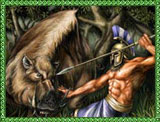 Most
of the mechanics of the previous games remain in place. At the start of most
campaigns—called “adventures” in the game—you’ll be confronted
with a vast expanse of land filled with some resources and lacking others. As you build
houses to attract settlers, you’ll also have to find a food source (depending upon
the area either fish, wild game, wheat or cheese) and a place to grow olives for oil and
sheep for fleece. Of course, you’ll also have to provide workshops to process these
items, and agoras and peddlers to distribute them, as well as an infrastructure of roads,
maintenance, and waterworks for your people. You’ll also need some money, so levying
taxes and establishing trade routes is essential. And since all work and no play makes
Eumenistes a dull boy, you should provide some culture for your people—like
philosophers, actors, and athletes. This just scratches the surface of the game; as the
city expands, you’ll want to upgrade housing to produce an elite warrior class (which
needs armor, wine and horses), build Hero’s Halls and Sanctuaries to attract heroes
and gods to your city, launch beautification projects, and establish alliances and conduct
wars. It’s a lot to handle, and much of the game’s fun derives from the frantic
yet delicate balancing acts you’ll have to perform as your city grows. Most
of the mechanics of the previous games remain in place. At the start of most
campaigns—called “adventures” in the game—you’ll be confronted
with a vast expanse of land filled with some resources and lacking others. As you build
houses to attract settlers, you’ll also have to find a food source (depending upon
the area either fish, wild game, wheat or cheese) and a place to grow olives for oil and
sheep for fleece. Of course, you’ll also have to provide workshops to process these
items, and agoras and peddlers to distribute them, as well as an infrastructure of roads,
maintenance, and waterworks for your people. You’ll also need some money, so levying
taxes and establishing trade routes is essential. And since all work and no play makes
Eumenistes a dull boy, you should provide some culture for your people—like
philosophers, actors, and athletes. This just scratches the surface of the game; as the
city expands, you’ll want to upgrade housing to produce an elite warrior class (which
needs armor, wine and horses), build Hero’s Halls and Sanctuaries to attract heroes
and gods to your city, launch beautification projects, and establish alliances and conduct
wars. It’s a lot to handle, and much of the game’s fun derives from the frantic
yet delicate balancing acts you’ll have to perform as your city grows.
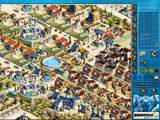 But
Zeus is also fun because the designers decided to back off from the faux historicism of
the earlier games. Zeus instead revels in Greek mythology, unleashing familiar Greek gods,
monsters, and heroes on the world. And as in Greek mythology, the gods are an ambiguous
bunch. If you build a sanctuary to them—which takes a good deal of time and
resources—you’ll gain their protection and a nice little benefit. For instance,
Dionysus provides abundant wine, Athena her services in war and a sacred olive grove,
Hermes swifter commoners and help with trade. On the other hand, if you anger a
god—and almost always this will not be your fault—they’ll rain hell down
upon you. In the early campaigns, Poseidon seems particularly ill-disposed to your
efforts, and either he or one of his minions will habitually obliterate your fisheries and
waterborne trade routes. Monsters roam the
Greek world as well, and everything from the
Calydonian Boar to Medusa to the Minotaur will attempt to ravage your lands. The best way
to defeat a monster is sending for a hero, and the only way to attract a hero is by
building a hero’s hall, which usually has its own long list of requirements. This
means that while you’re busy with stuff like making sure your people have enough
bread and circuses, you’ll also have to scrounge up enough extra resources to build a
grove for Dionysus or a hall for Perseus. While some might scoff at the mythology, I think
Impressions has implemented it very nicely. The Gods and monsters add a “wild
card” aspect to the game, and while all of the benefits you receive from the gods are
welcome, none of them are overpowering. But
Zeus is also fun because the designers decided to back off from the faux historicism of
the earlier games. Zeus instead revels in Greek mythology, unleashing familiar Greek gods,
monsters, and heroes on the world. And as in Greek mythology, the gods are an ambiguous
bunch. If you build a sanctuary to them—which takes a good deal of time and
resources—you’ll gain their protection and a nice little benefit. For instance,
Dionysus provides abundant wine, Athena her services in war and a sacred olive grove,
Hermes swifter commoners and help with trade. On the other hand, if you anger a
god—and almost always this will not be your fault—they’ll rain hell down
upon you. In the early campaigns, Poseidon seems particularly ill-disposed to your
efforts, and either he or one of his minions will habitually obliterate your fisheries and
waterborne trade routes. Monsters roam the
Greek world as well, and everything from the
Calydonian Boar to Medusa to the Minotaur will attempt to ravage your lands. The best way
to defeat a monster is sending for a hero, and the only way to attract a hero is by
building a hero’s hall, which usually has its own long list of requirements. This
means that while you’re busy with stuff like making sure your people have enough
bread and circuses, you’ll also have to scrounge up enough extra resources to build a
grove for Dionysus or a hall for Perseus. While some might scoff at the mythology, I think
Impressions has implemented it very nicely. The Gods and monsters add a “wild
card” aspect to the game, and while all of the benefits you receive from the gods are
welcome, none of them are overpowering.
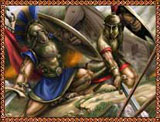 Impressions has
also introduced a new campaign structure; no longer do you begin every scenario in a
campaign building a city from the ground up—instead scenarios focus on the
development of a city and its colonies. So while one mission might focus on establishing
your city, the next may well emphasize developing that same city’s trade routes, or
fighting a war with a rival. While your parent city is thus engaged, you’ll probably
be asked to establish a few colonies, which you can then use as lucrative trade partners.
This makes for shorter (since you don’t have to build a huge city from nothing each
mission) but more varied scenarios, and Zeus is a better game for it. Each of these seven campaigns
are based upon a moment in Greek mythology—for example, the
stories of Zeus and Europa, Perseus and Medusa, the Trojan War, Jason and the Argonauts,
Hercules’ Labors. Again, this intermeddling of hardcore city building and whimsical
mythology works better than might be expected, and adds a big dollop of personality to the
game. Impressions has
also introduced a new campaign structure; no longer do you begin every scenario in a
campaign building a city from the ground up—instead scenarios focus on the
development of a city and its colonies. So while one mission might focus on establishing
your city, the next may well emphasize developing that same city’s trade routes, or
fighting a war with a rival. While your parent city is thus engaged, you’ll probably
be asked to establish a few colonies, which you can then use as lucrative trade partners.
This makes for shorter (since you don’t have to build a huge city from nothing each
mission) but more varied scenarios, and Zeus is a better game for it. Each of these seven campaigns
are based upon a moment in Greek mythology—for example, the
stories of Zeus and Europa, Perseus and Medusa, the Trojan War, Jason and the Argonauts,
Hercules’ Labors. Again, this intermeddling of hardcore city building and whimsical
mythology works better than might be expected, and adds a big dollop of personality to the
game.
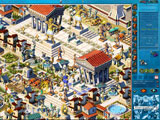 Gameplay has been
simplified as well. In the previous games, production venues like workshops, storehouses,
mines, and farms had to be located fairly close to residential areas, or no one would make
the long walk to work. This meant you had a lot of far-flung neighborhoods that you had to
sustain by constructing pricey infrastructure buildings. Even worse--since nobody wants to
live close to a mine or a slaughterhouse--these neighborhoods never got attractive enough
to develop, and usually became the ancient world’s answer to slums. In Zeus, there
are no such worries—you can build a mine clear across the screen and workers will
happily make the two-hour commute. This makes the game immeasurably easier, as you can
centralize your residential areas, and with a little luck and planning all of them will
develop to maximum capacity. In almost all of my games, all of my commoners were living in
maxed-out housing. You’d never see that in Caesar or Pharaoh. Roadblocks have also been simplified; they now
allow citizens with a specific mission to pass through, but not those with
neighborhood-specific quests—for instance, a merchant’s carriers will pass
through a roadblock to get supplies from a storehouse, but a merchant will not pass
through them, remaining confined to a certain neighborhood. While some may call this
“dumbing-down” I call it “making the game more fun.” Gameplay has been
simplified as well. In the previous games, production venues like workshops, storehouses,
mines, and farms had to be located fairly close to residential areas, or no one would make
the long walk to work. This meant you had a lot of far-flung neighborhoods that you had to
sustain by constructing pricey infrastructure buildings. Even worse--since nobody wants to
live close to a mine or a slaughterhouse--these neighborhoods never got attractive enough
to develop, and usually became the ancient world’s answer to slums. In Zeus, there
are no such worries—you can build a mine clear across the screen and workers will
happily make the two-hour commute. This makes the game immeasurably easier, as you can
centralize your residential areas, and with a little luck and planning all of them will
develop to maximum capacity. In almost all of my games, all of my commoners were living in
maxed-out housing. You’d never see that in Caesar or Pharaoh. Roadblocks have also been simplified; they now
allow citizens with a specific mission to pass through, but not those with
neighborhood-specific quests—for instance, a merchant’s carriers will pass
through a roadblock to get supplies from a storehouse, but a merchant will not pass
through them, remaining confined to a certain neighborhood. While some may call this
“dumbing-down” I call it “making the game more fun.”
Diplomacy and trade
are also much cleaner in Zeus, and this Greek world is much larger than the Roman or
Egyptian ones. In each campaign, you’ll interact with several other city-states and
foreign cities. Some will be rivals, some will wish to trade with you, others will be
indifferent. With a little effort, though, you can usually (through gifts and assistance)
convince most of the world to lend your city a hand. A nice new feature allows you to
requisition help from other cities, and very often a gift of surplus materials will
persuade a city to grant your request.
Graphics and sound
are of course up to the usual excellent Impressions standard, and the game includes a
lengthy and comprehensive set of tutorials and a deep 200-page manual. The interface is
intuitive and easy to use.
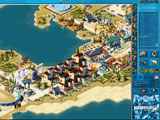 There remains only
one fly in the ambrosia, and that is the game’s combat system. It’s been
wretched and ill-conceived throughout the entire series, and it doesn’t get much
better here. Initially, all your units will be commoners, but as your city grows
you’ll be able to recruit armored and mounted warriors from your elite citizens. OK,
good enough. But the implementation of actual combat is awful. Usually it goes something
like this: a small number of enemy soldiers appear on a map edge and make a beeline for
your city. You click on banners located at palace that represent your troops, click on
button to muster troops, then click on banner and click on location you want troops to
move to, then click on button to indicate what troops should do. All of this is awkward.
It’s by far the most frustrating and clumsy real-time combat system I’ve ever
seen, and it’s beyond me how a game this good could have a feature this bad in it.
Fortunately, combat doesn’t play a large part in Zeus, and you can usually bribe most
potential invaders. There remains only
one fly in the ambrosia, and that is the game’s combat system. It’s been
wretched and ill-conceived throughout the entire series, and it doesn’t get much
better here. Initially, all your units will be commoners, but as your city grows
you’ll be able to recruit armored and mounted warriors from your elite citizens. OK,
good enough. But the implementation of actual combat is awful. Usually it goes something
like this: a small number of enemy soldiers appear on a map edge and make a beeline for
your city. You click on banners located at palace that represent your troops, click on
button to muster troops, then click on banner and click on location you want troops to
move to, then click on button to indicate what troops should do. All of this is awkward.
It’s by far the most frustrating and clumsy real-time combat system I’ve ever
seen, and it’s beyond me how a game this good could have a feature this bad in it.
Fortunately, combat doesn’t play a large part in Zeus, and you can usually bribe most
potential invaders.
The combat system
is all that keeps Zeus from a five-star rating. Other than that, it’s an excellent
game that’s less demanding but much more fun than the Caesar and Pharaoh series. Now
if Impressions would only talk to Blizzard about that real-time combat stuff . . .
Rick
Fehrenbacher |
